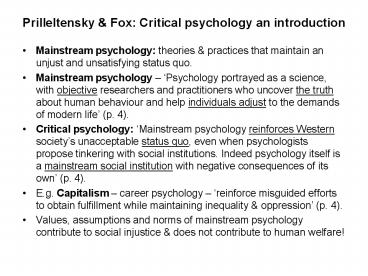Prilleltensky - PowerPoint PPT Presentation
1 / 8
Title:
Prilleltensky
Description:
Mainstream psychology Psychology portrayed as a science, with objective ... career psychology reinforce misguided efforts to obtain fulfillment ... – PowerPoint PPT presentation
Number of Views:115
Avg rating:3.0/5.0
Title: Prilleltensky
1
Prilleltensky Fox Critical psychology an
introduction
- Mainstream psychology theories practices that
maintain an unjust and unsatisfying status quo. - Mainstream psychology Psychology portrayed as
a science, with objective researchers and
practitioners who uncover the truth about human
behaviour and help individuals adjust to the
demands of modern life (p. 4). - Critical psychology Mainstream psychology
reinforces Western societys unacceptable status
quo, even when psychologists propose tinkering
with social institutions. Indeed psychology
itself is a mainstream social institution with
negative consequences of its own (p. 4). - E.g. Capitalism career psychology reinforce
misguided efforts to obtain fulfillment while
maintaining inequality oppression (p. 4). - Values, assumptions and norms of mainstream
psychology contribute to social injustice does
not contribute to human welfare!
2
- Critical psychology diverse field common
underlying assumption or central focus altering
the status quo in fundamental ways. - Uncomfortable for those wishing to be
psychologists do we throw out mainstream
psychology! - Critical concerns with mainstream psychology
- Individualism Western Capitalism encourages
people to seek meaning through individual
pursuits such as advancing careers provide
economic benefits to owners and privileged
groups. - Interaction, communication and care?
- Political economic elites make decisions for
the rest of us. - Outcomes?
- Oppression inequality what seems normal
traditional is in fact oppression inequality. - Oppressors do not believe they are oppressors
as individual psychologists do not believe they
reinforce oppressive institutions. - Skills status help elite segments of society
retain control reinforcing status quo.
3
- Its norms typically reflect the values and
assumptions and interests of middle upper class
professionals. - Good intentions are not enough!
- Does a traditional stance mislead people into
identifying problems as purely individual? - Vision for critical psychology
- May help us resolve certain issues but often
raises equally difficult issues. - Different values and assumptions.
- Values
- Social justice, self-determination
participation, caring compassion, health
human diversity. - We need to advance values in a balance way
- Values are determined in a particular
socio-political context. - Some values have more potential for social
transformation than others.
4
- Assumptions
- Problem definition and solutions
- Mainstream psychology individual unity of focus
- Critical concerns problems are defined in terms
of intrapersonal interpersonal deficits, power
arrangements in society overlooked, interventions
address individual neglect social systems,
blame individual. - Critical Psychology Problems are defined
holistically in terms of disempowering
oppressive circumstances (ecological model),
interventions address social dimensions, try to
equalise power, strive for social justice in
access to resources. - The good society
- Mainstream society good life is based on
individualism accumulation of wealth and
material resources (Engen!) - Critical Psychology good life based on
reciprocal self-determination people promote
own interests in consideration of others needs.
5
- Research knowledge
- Mainstream psychology Knowledge viewed as
accumulation of objective fact devoid of personal
political dimensions value free science can
solve problems. - Critical psychology Knowledge viewed as infused
with power and political uses (e.g. culture and
community), subjective. Research used at the
service of moral values to help oppressed
populations.
6
Prilleltensky Nelson Doing psychology
critically
- Power pivotal in attaining well being opposing
injustice. - Break silence on power critical psychologists try
to understand how systems of social regulation
shape human experience. - Outcome of power based on interaction of agency
(ability and activity) and structure (contextual
dynamics). - Adverse conditions make opportunities available
to some and block opportunities for others. - Internalize social prescriptions accept them as
normal natural. - Human actions therefore embedded not in
personal, innate desires but rather embedded in
political norms and regulations. - Psychologists want to bring about well-being by
treating the individual without challenging or
changing social oppression. - Well-Being achieved by simultaneous balanced
satisfaction of personal, relational and
collective needs. - Ecological hierarchical structure of
well-being.
7
- we cannot accept definitions of well-being that
are based exclusively on intra-psychic factors.
These definitions tend to be psycho-centric
because they concentrate on the cognitive and
emotional sources and consequences of suffering
and well-being, to the exclusion of the social,
material, and political roots and effects of lack
of power (p. 11). - Oppression state of asymmetric power relations
characterized by domination, subordination and
resistance. Domination is exerted by restricting
access to material resources and imparting in
people self-deprecating views about themselves. - Liberation critical psychology needs to engage
with the political and the psychological at the
same time. Personal, relational and collective
well-being (ecological).
8
- Critical psychology
- Crossing boundaries different sources of
knowledge (sociology, anthropology, history,
politics) different levels of analyses not
just the mind and intra-psychic processes
broaden to other ecological levels
comprehensive view of how family, community,
political shape the life experiences of people. - Communication of meanings close collaboration
with people whose formal education may be
different to ours language. - Practice in context exploring our unique
cultural heritage, taking time to listen to
concerns and world views of others and dialogue. - Community Psychology Critical Psychology
- CP (prescribed text) focus on ecological
analyses, problems framed in terms of social
context and cultural diversity, emancipatory etc. - Critical community psychology?




















